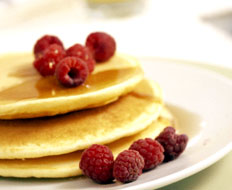Seven years ago, at the height of the Atkins craze, our sales were down especially at breakfast. Our amazing artisan breakfast pastries and breads stayed on the shelves. And our customers stayed at home instead of just coming in to get the specialty coffee drink that had accompanied their breakfasts.
These customers often picked up grab-and-go sandwiches and salads while in the store making their other purchases, so categories beyond breakfast were hurting too. Then eggs came to the rescue.
Not willing to let Dr. Atkins followers kill our sales, our president John Clay made the decision to add omelets and other egg-based items to our menu. We also added waffles, pancakes, and French toast for kids and those customers who weren’t dieting. Sales quickly recovered and have stayed strong even when other parts of the business struggled during the Great Recession. Revenue and check averages went way up as we were selling items that cost twice as much and parents now brought in the entire family for breakfast.
Adding these items was profitable and cost effective—a win-win. For starters, we already stocked most of the non-egg ingredients for omelets thanks to our sandwiches and salads from other dayparts. Second, eggs are cheap. For those of you without stoves in your stores, some jurisdictions will let you use induction burners without adding hoods to your locations so the equipment cost can be very, very low. As far as non-egg items go, Carbon’s Golden Malted will provide you with a great waffle product and the equipment you need to cook great waffles in just a couple of minutes.
Although my mother always claimed that making good omelets was very hard, we found that cooking them was actually pretty easy. During the weekends and busy days, we had several cooks working. Most of the time, however, we would have only one dedicated cook and one floater who could be borrowed during peak periods. It does take some skill to cook 4–5 items at once, but our best cooks, Paul and Anthony, make it look easy and have generously shared their knowledge and techniques with trainees.
We eventually got rid of pancakes since they killed our mojo thanks to equipment limitations, but that move didn't decrease sales.
If our experience at Bread & Co. isn't convincing enough, there's data that supports fast-casual operators adding breakfast. We've found that breakfast is the most habitual of meals. Once customers pick their breakfast destination of choice, they go back there over and over again with much less dining around than at lunch or dinner.
According to NPD, morning meals at fast-casual restaurants have gone up 20 percent in the last few years, but the untapped market is still huge as consumers skip more morning meals than are served in restaurants.
The big quick serves still dominate the segment, and those of us in fast casual will never be able to match the speed of the drive thru. However, I believe that there are plenty of customers who will come inside and spend the few extra minutes it takes to make a high-quality omelet or other breakfast item as a relaxing start to the rest of their day.
Fast casual is as much about the food quality, customization of product, and atmosphere as anything else, and morning is a time where we can really make the most of this competitive advantage.
We've even seen breakfast meetings at our stores increase greatly since we expanded our breakfast menu. Furthermore, the portability of butane and induction burners allows for lots of off-site catering opportunities where you can bring hot and customized breakfasts to the customer.
If you are not serving an expanded breakfast now, you are missing a great opportunity.












